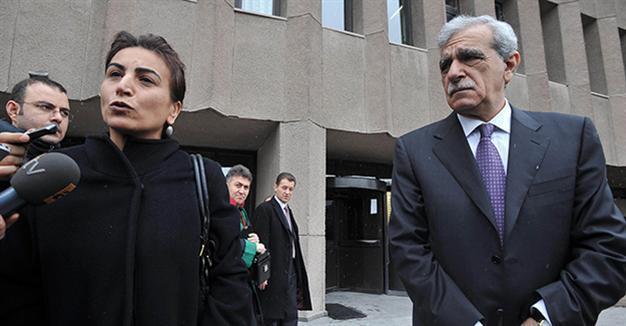ECHR condemns Turkey for party dissolution over terror links
STRASBOURG

In this DHA file photo, DTP co-chairs Aysel Tuğluk (L) and Ahmet Türk speak to reporters.
The European Court of Human Rights (ECHR) has condemned Turkey for dissolving a political party in 2009 for alleged ties to the outlawed Kurdistan Workers’ Party (PKK), saying the party did not promote violence nor warrant such a severe sanction.
Turkey violated the right to freedom of assembly and association by ordering the dissolution of the Democratic Society Party (DTP), the ECHR ruled on Jan. 12.
The Turkish government ordered the DTP’s dissolution in 2009 after the Constitutional Court ruled on Dec. 11, 2009 that the party had similar political targets as the PKK, an outlawed group that Turkish security forces have been fighting for over three decades.
Then DTP co-chairs Aysel Tuğluk and Ahmet Türk were suspended from parliament upon the Constitutional Court’s ruling and 37 members of the party were suspended from politics for five years.
Tuğluk and Türk filed a lawsuit with the ECHR following the dissolution of the DTP, leading to the Jan. 12 ruling.
The ECHR said the reasons for “the dissolution of the DTP, one of the main political actors that had argued in favor of a peaceful solution to the Kurdish problem, could not be regarded as sufficient to justify interference in its right to freedom of association.”
It added that none of the DTP’s projects were “incompatible with the concept of a democratic society.”
The ECHR also ruled that Turkey was in breach of the European Convention on Human Rights in suspending Tuğluk and Türk, given that their parliamentary mandates were guaranteed under the right to free elections.
It noted that the leaders’ speeches did not encourage “the use of violence, armed resistance or insurrection.”
The judges’ unanimous decision found that while Turkey criticized the DTP for not openly distancing itself from some members’ “indirect support of terrorism,” this could not justify “a sanction of such severity as the dissolution of an entire party.”
In March 2009, the DTP had won 5.7 percent of the vote in local elections.
